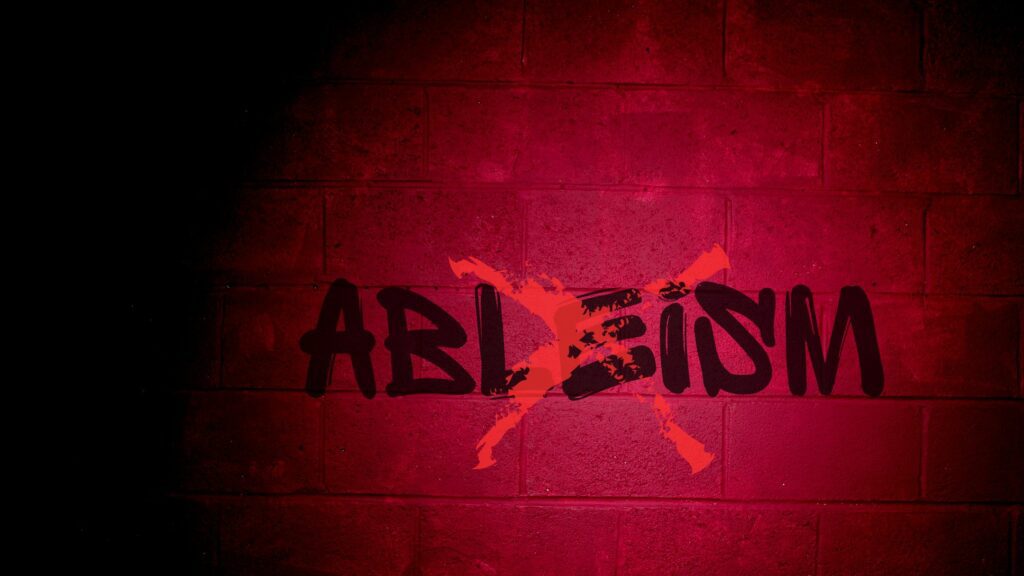

Ableism is a form of discrimination that is often less discussed but equally important as sexism, racism, homophobia, and other widespread prejudices. It involves the systematic discrimination, prejudice, and exclusion of individuals with disabilities. This discrimination is based on the belief that certain abilities are superior and should be considered normal, while having a disability is viewed as inferior and abnormal.
Notably, anyone can become part of the disabled community at any time, and this community includes about 25 percent of the population. This makes it the largest marginalized group globally. Yet, despite its prevalence, ableism doesn’t receive as much attention as other forms of discrimination.
Common instances of ableism that are prevalent in our daily lives include:
- Neglecting to incorporate accessibility features into building design plans
- Failing to provide braille on signs, elevator buttons, and other essential elements in buildings
- Selecting venues for meetings or events that are inaccessible, thereby excluding certain participants
- Parking in disabled parking places without a permit
- Portraying disability in news stories, movies, and popular media as either tragic or inspirational
- Assuming that individuals with disabilities desire or require “fixing”
- Using disability as a comedic tool or mocking individuals with disabilities
Unfortunately, I rarely hear ableism referred to when someone talks about forms of discrimination, unless they are a member of the disabled community.
What Ableism Looks Like to Me
Before the age of 29, I didn’t have much awareness of ableism or the ways in which I may have unknowingly contributed to it. However, everything changed when I was diagnosed with rheumatoid arthritis (RA) and entered the disabled community.
It wasn’t until I personally faced it and connected with others in my community who live with chronic illnesses or disabilities that I truly understood the extent of ableism and the harm it can cause.
This eye-opening experience not only made me realize the prevalence and impact of ableism in our society but also what it feels like to experience it on a personal level. Ableism can have a significant impact on my self-confidence and self-worth, leaving me feeling isolated and lonely. It can lead to emotions of guilt, shame, depression, anxiety, and frustration.
Given that RA can have a variety of symptoms ranging from pain, fatigue, brain fog, weakness and mobility issues, there are many ways I experience ableism.
Misconceptions and Stigmas that Lead to Ableism
Individuals with arthritis frequently encounter pervasive misconceptions and stereotypes about their condition. Since arthritis is often an invisible disability — symptoms may not always be visible to others — those living with it can often face skepticism, disbelief, and misguided judgments from others who underestimate its impact. This can lead to feelings of isolation, frustration, and invalidation.
Arthritis is also a dynamic disability, where symptoms fluctuate in severity, and that exposes me to heightened instances of ableism from those who may not grasp its nuances. It’s not uncommon for people to assume your disability has to be visible for you to be disabled.
Often, I face invasive questions about my medical history or personal life, especially in dating or personal connections. Questions like “Are you actually disabled?” or “To what extent are you disabled?” are all too common.
Some of the examples of ableism I experience as someone with arthritis, include:
- You can do it.
- You’ll be fine.
- You’re too young for that.
- It’s all in your head.
- Just push through it.
- But you don’t look sick.
- If you did x, y, and z you wouldn’t be sick anymore.
- Your medications are making you sicker.
- I know someone who has that but they can do it.
- You could do it yesterday.
- But you don’t look sick?
- People get sick and die, it’s not my responsibility to protect you from a virus.
Sound annoyingly familiar? There are more out there but those are the most common that I experience.
Escaping Internalized Ableism
The ableist attitudes prevalent in society also have far-reaching emotional and physical effects. The constant reinforcement of ableist beliefs can contribute to internalized ableism, causing myself and I am sure others, to perceive themselves as lesser or inadequate due to our disability. This internal struggle, coupled with the physical challenges of managing arthritis, can lead to mental health issues such as anxiety and depression. Guilt is a far too common emotion that I experience with arthritis, and it can be difficult to avoid given the unpredictability of my chronic illness.
It is also hard to not envy what someone without chronic illness my age can accomplish, and sometimes equally as difficult to explain to someone how my disability affects my life if they have not experienced it firsthand.
Raising Awareness of Ableism
Ableism is a form of discrimination that needs to be addressed more proactively. Empowering individuals with arthritis to advocate and share their experiences and perspectives can help dispel misconceptions and raise awareness about the realities they face.
By amplifying our voices, we can create a more inclusive society that prioritizes accessibility, understanding, and respect for all individuals, regardless of their abilities. Change will happen if we stay silent. It is crucial that we have open discussions about ableism and work toward making a more inclusive and equitable world for everyone.
Be a More Proactive Patient with PatientSpot
PatientSpot (formerly ArthritisPower) is a patient-led, patient-centered research registry for people living with chronic conditions. You can participate in voluntary research studies about your health conditions and use the app to track your symptoms, disease activity, and medications — and share with your doctor. Learn more and sign up here.





